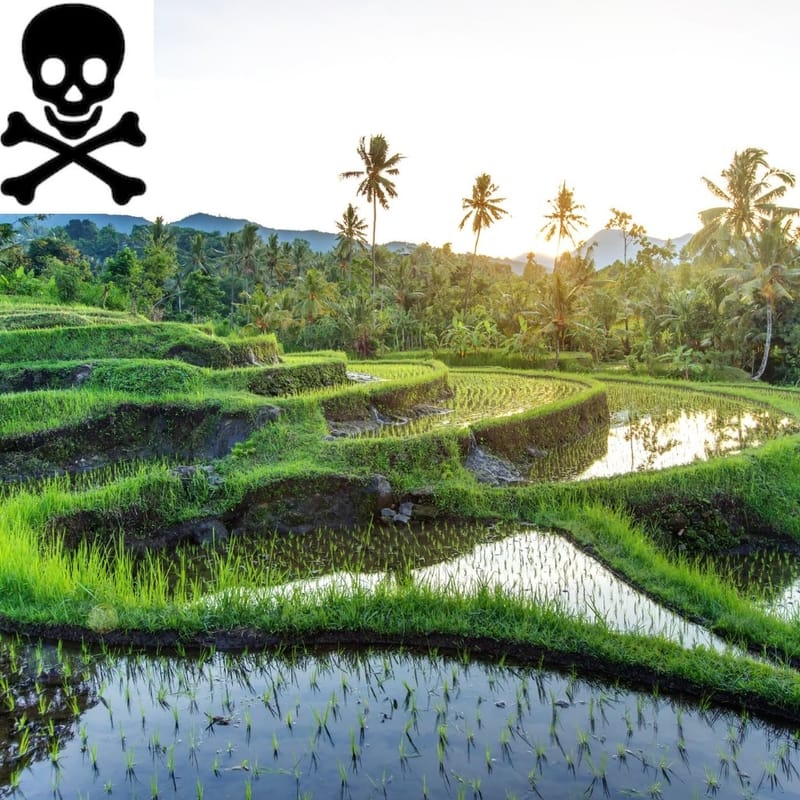
Tourists love spending time in the rice fields of Bali, admiring the amazing terraces of Tegallalang and Jatiluwih. They sip their latte and look out over the green swathes of young rice, murmuring how lovely it is to be in nature.
But they aren’t.
These rice fields are anything but natural. Quite apart from the artificial terracing to enable the farming on steep hillsides, the rice is selectively bred to require just 90 days to harvest, and the amount of chemicals required to grow the rice is extreme, for the soil is dead. So is the wildlife.
One of the commonest birds in Bali was a little flycatcher that made its nest in the rice, weaving a little round ball amongst the growing stems. The sudden switch to 3 month rice was too fast for a bird that needed months to lay eggs and raise their babies. The eggs and babies died at harvest, the animal loving Balinese farmers weeping over their bodies, but unable to do anything. Millions of birds died. Meanwhile, the rice beetle arrived and none of the pesticides available to the Balinese worked. So they used everything they could get, heavily subsidized by the government. It doesn’t have much effect on the rice beetle, which sucks the sap from ripe rice stalks and can lose the farmer 70% of his crop. But the pesticide is their only solution. They used to crush snails and remove the bugs on the flesh every morning, but the pesticide kills the snails, even if the bugs aren’t much bothered.
The pesticide is the source of the Ubud flu, which the tourists complain about in wondering tones. Do they have hayfever, they wonder? They must be allergic to something, definitely gluten or meat. No, it is the miasma of pesticide that floats over their natural paradise.
It isn’t just the tourists that suffer from the pesticide. The farmers, of course, but the wildlife is the first to go. Especially frogs, the bell weather of ecosystems. This is a particular tragedy, for on the third month of his baby’s birth, the Balinese father must personally go and catch a frog, which is used in a celebratory ceremony. They have to go further and further afield to find a frog, generating much angst.
And we still haven’t looked at the economics of growing rice.
Here we run into the major problem for Indonesian farmers, which is primogeniture. In the West, the eldest son inherits the farm. All of it. Tough on the rest of the kids, hope daddy gave them something before he died, because the new landowner is unlikely to do so. He will send his brethren off to join the army and his sisters he will marry off to suitable farmers. Here in the kinder, gentler, Far East, such behavior is frowned upon. Instead, the farm is evenly split between all the brothers. The consequence today is that few farms are large enough to earn a living.
In Bali, with its burgeoning tourist industry that has just fallen apart, this meant that one son would be selected to look after all the family land, held by the family not just one person, while the others went off to pursue careers usually related to tourism. Every time the farmer needed help, the whole family rallied round for planting, harvest and major maintenance. Free labour. Necessary, as the proceeds of a typical farm are perhaps $500 a year. Before cost of chemicals, materials, labour, ploughing etc. No wonder few families sell their rice, preferring to eat it themselves. In this way, the Balinese thrive. They grow their own food, live rent free and will pool the money earned to buy scooters for kids and pay for schooling and other essentials.
One thing which is rarely essential is art and culture. Yes, the old ladies teach the young girls to dance, but the great artisans are disappearing. Two years ago I was delighted to find a carving competition, with maybe two hundred teenagers working on bits of wood. I complimented the organizer on encouraging Balinese culture in this manner. He gave me an odd look and said they were all Javanese.
Two generations ago, the President called for the country to be self-sufficient in rice. This created policies which made farmers grow rice, and virtually only rice. For two or three generations they have grown only rice. Many of the old skills of keeping the land healthy have been lost and farmers have become risk averse, not wishing to plant different crops. I generalize, of course and there are plenty of exceptions.
Nevertheless, farming is not an attractive career for an ambitious young Indonesian who knows all too well that he cannot make enough money growing rice on his tiny farm to do more than feed his family. Indeed, rice farming, those beautiful green fields, keep the farmer in bondage he cannot break.
So, there you have it. Those beautiful green rice paddies that are so loved by tourists, they are toxic and keep the farmers in poverty. This is the challenge facing Indonesia.
Royal Spice Gardens is an Indonesian Foreign Investment Company, in Indonesia known as a Perusahaan Modal Asing (PMA).
NIB Licence number 0220100502286. NPWP: 94.830.504.0- 905.000.
PT Royal Spice Gardens Indonesia, Jl. Prof. Dr. Ida Bagus Mantra, Jl. Pantai Saba No. 999 x No. Perempatan, Saba, Blahbatuh, Gianyar, Bali 80581 Indonesia
Website by Simia Solutions / Cre8 Design Studio
Powered by Pak Kriss’s Compliance Framework.
Even in uncertain times, credible, stable & realistic opportunities are available for the astute investor.
Get the edge by obtaining clear, concise and rapid information. Fill out the form to receive our latest prospectus!